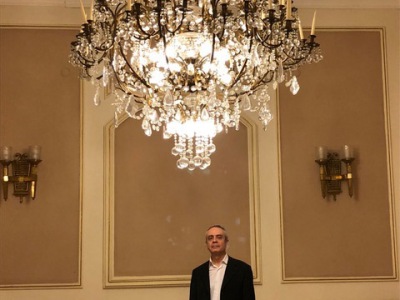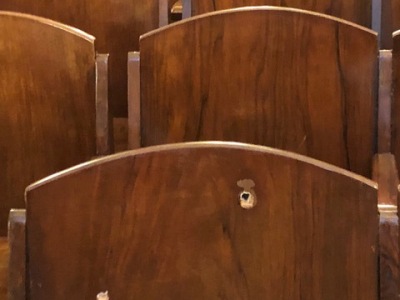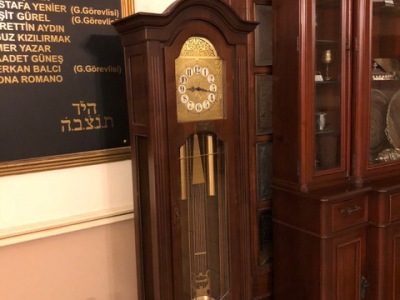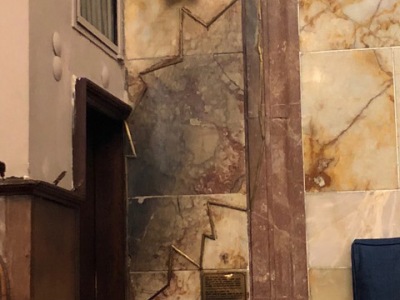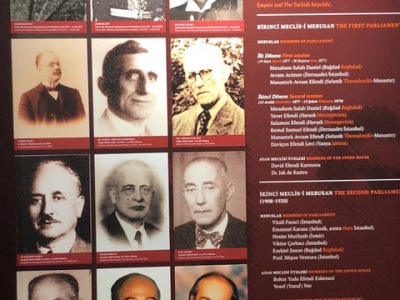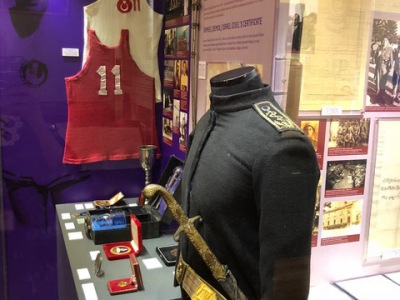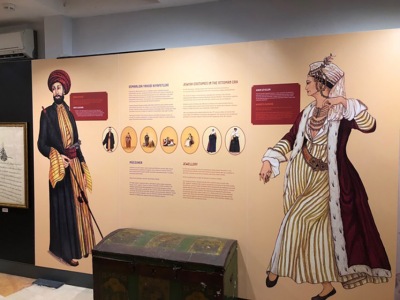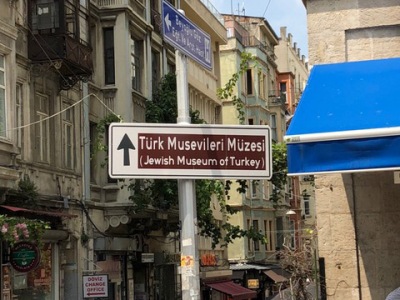Ferdinand the Foolish – A Visit to the Jewish Museum in Istanbul
Author: Cheryl Benard
The start of my visit is promising. I am curious to see how ordinary Turks react to mention of the Jewish Museum of Turkey and the concierge in the hotel, told of my destination, is helpful and solicitous. He calls to make sure that the museum is indeed open today, and to confirm the address, because he has heard (correctly) that they recently moved to a new location. He marks the best route on a map, then goes outside with me to hail a cab and to explain exactly to the driver where we are going and how to get there.
Then things go downhill. The minute we pull into the road, the taxi driver starts trying to dissuade me from my plan. Why on earth would I want to go there? It is not interesting. When I persist, he says he will wait outside, because I will quickly see that he is right and will be finished in just a few minutes. Then he claims that he doesn’t know where it is and won’t be able to find it. It’s in a remote area, he alleges. (Not true – it’s in a highly frequented tourist neighborhood). In the face of my determination he resigns himself and suddenly knows exactly how to get there, and even where the (indeed somewhat hard to spot) entrance is located.
Security, as the museum’s website warns beforehand, is tight. There is a police booth directly outside. You must have your passport, which remains with the guard until you leave. You pass through a metal detector and a bag-check and traverse several heavy, metal doors that presumably can be individually sealed shut to block intruders. At last I arrive in the gift shop. I introduce myself to “Roberto” – we talked earlier on the phone – and pay the admission, 20 Turkish Lira or about 4 dollars.
The exhibit is spread across two levels and contains a wealth of information, artifacts, photos and stories. The taxi driver was: wrong.
Reflecting on my visit afterward, three main insights stand out. First, that the Ottoman Empire (founded 1299 by Osman Bey) were – not all of them of course, and not always, but in general – amazingly enlightened on the matter of religious tolerance. Just consider this edict of the sultan: “God has bestowed many countries to me and has commanded me to look after, to provide sustenance for, and to protect the descendants of his disciples Prophets Abraham and Jacob…Who amongst you would like to come to the capital, Istanbul, with God’s help, and settle there under the shadows of fig trees and vineyards, to live in peace, to engage freely in commerce and to own property?”
The Ottoman Empire repeatedly served as a place of refuge, and even as a cultural magnet, for Jews enduring harsh treatment elsewhere, not just famously Spain, but also France, Poland, Bavaria and the Ukraine. The largest influx of course came from Andalusia, which expelled the entire Jewish community at the time of the Inquisition, in 1492. I knew they found shelter in Turkey, but I had not known that the Ottoman Sultan even sent his navy to help evacuate them to his own realm. This hospitality, while beneficent, was also quite pragmatic. Though the refugees were not permitted by Spain to take their physical wealth with them, they brought plenty of other highly valuable resources: familiarity with commerce, skills in many different trades and arts including printing, strong knowledge in science and medicine, and a terrific work ethic. Over time they became important businessmen, ministers in the Ottoman government, advisors to the court and personal physicians to the rulers.
Here is Sultan Beyazid II’s decree on the subject, addressed to the governors of all Ottoman principalities:
“…(rather than) refuse entry to the Jews from Spain, they should be welcomed with complete openheartedness and whosoever act in opposition to this by treating them with contempt or who causes them harm in any way shall be punished by death…”
And he apparently gained some amusement from pondering the fanaticism of the Catholic Spaniards, noting that: “You venture to call Ferdinand a wise ruler? He who has impoverished his own country and enriched mine!”
Inevitably, my second take-away has to be regret, that Islam has in recent ages and almost everywhere departed so vastly from the stance of the Ottomans. In the 19th century, things started to fall apart, and the decline has been a steep one since then.
This insight was horribly reinforced by the third part of my visit. Roberto offered to show me the adjacent Neve Shalom (ironically the name means “oasis of peace”) synagogue. He let me admire the glass windows and other decorations and told me that this is the largest synagogue in Istanbul, before pointing to a blackened spot on the wall in one corner. That, he said, was from the grenades that were thrown into the synagogue during one of three terrorist attacks on the congregation. In the course of the rebuilding, they decided to leave the marks as a reminder, and pointing to a row of seats, he shows me that the chairs marred by bullet holes have also been left in place.
The first attack was in 1986. At that time the synagogue was unguarded and open to anyone, which terrorists with automatic weapons took advantage of to burst into an ongoing service and mow down the worshippers. Twenty-two people were killed as they prayed. Subsequently the Turkish government posted guards – two of them, and a policeman, were killed along with several members of the congregation during a third attack in 2003, when a series of car bombs exploded here and in front of a second synagogue, leaving 57 people dead and 700 wounded. (The second attack, in 1992, thankfully failed to injure anyone.)
Lastly Roberto took me into the hallway of the synagogue, where mementos of the attacks are displayed. There is a grandfather clock, frozen at the exact time of the first attack, its glass shattered. A plaque commemorates those who were murdered, with special prominence given to the two guards and the policeman. My host turns on the electricity to illuminate a beautiful crystal chandelier – a gift of solidarity and consolation from the Israeli government, he tells me. It had originally hung in the Israeli embassy in Buenos Aires, which was attacked in 1992 with 29 fatalities and 242 injured.
Roberto tells me that the Jewish population of Turkey has declined drastically and things at present are, while not directly menacing, also not exactly comfortable. Most emigrees go to Israel but – having kept their Spanish language alive for all those centuries since the expulsion from Andalusia – many also go to South America. A loss for Turkey that the Ottoman Sultans would have deplored.

